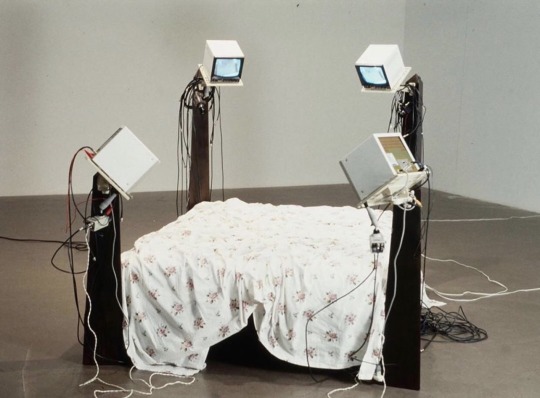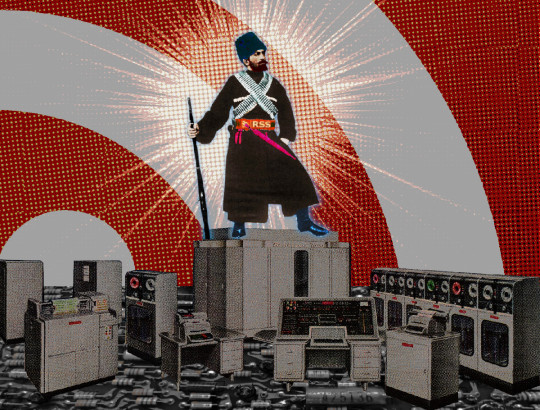#surveillance -
Explore tagged Tumblr posts
Text
Oh yikes






Link to thread.
Link to article.
Link to author's bio.
Alt text enabled on all images.
12K notes
·
View notes
Text
very great coverage of stalkerware use by government workers in australia, im very happy to have worked with crikey to make this reporting possible!
7K notes
·
View notes
Text

Julia Scher: Surveillance Bed III (1994)
11K notes
·
View notes
Text


Once again we're reminded: Fuck the ADL, its an Israeli supremacist group and nothing more.
#adl#anti defamation league#antifa#antifascism#antifascist action#fascism#israel#genocide#occupation#surveillance#blm#droptheadl#zionism
2K notes
·
View notes
Text
You should be using an RSS reader

On OCTOBER 23 at 7PM, I'll be in DECATUR, GEORGIA, presenting my novel THE BEZZLE at EAGLE EYE BOOKS.

No matter how hard we all wish it were otherwise, the sad fact is that there aren't really individual solutions to systemic problems. For example: your personal diligence in recycling will have no meaningful impact on the climate emergency.
I get it. People write to me all the time, they say, "What can I change about my life to fight enshittification, or, at the very least, to reduce the amount of enshittification that I, personally, experience?"
It's frustrating, but my general answer is, "Join a movement. Get involved with a union, with EFF, with the FSF. Tell your Congressional candidate to defend Lina Khan from billionaire Dem donors who want her fired. Do something systemic."
There's very little you can do as a consumer. You're not going to shop your way out of monopoly capitalism. Now that Amazon has destroyed most of the brick-and-mortar and digital stores out of business, boycotting Amazon often just means doing without. The collective action problem of leaving Twitter or Facebook is so insurmountable that you end up stuck there, with a bunch of people you love and rely on, who all love each other, all hate the platform, but can't agree on a day and time to leave or a destination to leave for and so end up stuck there.
I've been experiencing some challenging stuff in my personal life lately and yesterday, I just found myself unable to deal with my usual podcast fare so I tuned into the videos from the very last XOXO, in search of uplifting fare:
https://www.youtube.com/@xoxofest
I found it. Talks by Dan Olson, Cabel Sasser, Ed Yong and many others, especially Molly White:
https://www.youtube.com/watch?v=MTaeVVAvk-c
Molly's talk was so, so good, but when I got to her call to action, I found myself pulling a bit of a face:
But the platforms do not exist without the people, and there are a lot more of us than there are of them. The platforms have installed themselves in a position of power, but they are also vulnerable…
Are the platforms really that vulnerable? The collective action problem is so hard, the switching costs are so high – maybe the fact that "there's a lot more of us than there are of them" is a bug, not a feature. The more of us there are, the thornier our collective action problem and the higher the switching costs, after all.
And then I had a realization: the conduit through which I experience Molly's excellent work is totally enshittification-proof, and the more I use it, the easier it is for everyone to be less enshittified.
This conduit is anti-lock-in, it works for nearly the whole internet. It is surveillance-resistant, far more accessible than the web or any mobile app interface. It is my secret super-power.
It's RSS.
RSS (one of those ancient internet acronyms with multiple definitions, including, but not limited to, "Really Simple Syndication") is an invisible, automatic way for internet-connected systems to public "feeds." For example, rather than reloading the Wired homepage every day and trying to figure out which stories are new (their layout makes this very hard to do!), you can just sign up for Wired's RSS feed, and use an RSS reader to monitor the site and preview new stories the moment they're published. Wired pushes about 600 words from each article into that feed, stripped of the usual stuff that makes Wired nearly impossible to read: no 20-second delay subscription pop-up, text in a font and size of your choosing. You can follow Wired's feed without any cookies, and Wired gets no information about which of its stories you read. Wired doesn't even get to know that you're monitoring its feed.
I don't mean to pick on Wired here. This goes for every news source I follow – from CNN to the New York Times. But RSS isn't just good for the news! It's good for everything. Your friends' blogs? Every blogging platform emits an RSS feed by default. You can follow every one of them in your reader.
Not just blogs. Do you follow a bunch of substackers or other newsletters? They've all got RSS feeds. You can read those newsletters without ever registering in the analytics of the platforms that host them. The text shows up in black and white (not the sadistic, 8-point, 80% grey-on-white type these things all default to). It is always delivered, without any risk of your email provider misclassifying an update as spam:
https://pluralistic.net/2021/10/10/dead-letters/
Did you know that, by default, your email sends information to mailing list platforms about your reading activity? The platform gets to know if you opened the message, and often how far along you've read in it. On top of that, they get all the private information your browser or app leaks about you, including your location. This is unbelievably gross, and you get to bypass all of it, just by reading in RSS.
Are your friends too pithy for a newsletter, preferring to quip on social media? Unfortunately, it's pretty hard to get an RSS feed from Insta/FB/Twitter, but all those new ones that have popped up? They all have feeds. You can follow any Mastodon account (which means you can follow any Threads account) via RSS. Same for Bluesky. That also goes for older platforms, like Tumblr and Medium. There's RSS for Hacker News, and there's a sub-feed for the comments on every story. You can get RSS feeds for the Fedex, UPS and USPS parcels you're awaiting, too.
Your local politician's website probably has an RSS feed. Ditto your state and national reps. There's an RSS feed for each federal agency (the FCC has a great blog!).
Your RSS reader lets you put all these feeds into folders if you want. You can even create automatic folders, based on keywords, or even things like "infrequently updated sites" (I follow a bunch of people via RSS who only update a couple times per year – cough, Danny O'Brien, cough – and never miss a post).
Your RSS reader doesn't (necessarily) have an algorithm. By default, you'll get everything as it appears, in reverse-chronological order.
Does that remind you of anything? Right: this is how social media used to work, before it was enshittified. You can single-handedly disenshittify your experience of virtually the entire web, just by switching to RSS, traveling back in time to the days when Facebook and Twitter were more interested in showing you the things you asked to see, rather than the ads and boosted content someone else would pay to cram into your eyeballs.
Now, you sign up to so many feeds that you're feeling overwhelmed and you want an algorithm to prioritize posts – or recommend content. Lots of RSS readers have some kind of algorithm and recommendation system (I use News, which offers both, though I don't use them – I like the glorious higgeldy-piggeldy of the undifferentiated firehose feed).
But you control the algorithm, you control the recommendations. And if a new RSS reader pops up with an algorithm you're dying to try, you can export all the feeds you follow with a single click, which will generate an OPML file. Then, with one click, you can import that OPML file into any other RSS reader in existence and all your feeds will be seamlessly migrated there. You can delete your old account, or you can even use different readers for different purposes.
You can access RSS in a browser or in an app on your phone (most RSS readers have an app), and they'll sync up, so a story you mark to read later on your phone will be waiting for you the next time you load up your reader in a browser tab, and you won't see the same stories twice (unless you want to, in which case you can mark them as unread).
RSS basically works like social media should work. Using RSS is a chance to visit a utopian future in which the platforms have no power, and all power is vested in publishers, who get to decide what to publish, and in readers, who have total control over what they read and how, without leaking any personal information through the simple act of reading.
And here's the best part: every time you use RSS, you bring that world closer into being! The collective action problem that the publishers and friends and politicians and businesses you care about is caused by the fact that everyone they want to reach is on a platform, so if they leave the platform, they'll lose that community. But the more people who use RSS to follow them, the less they'll depend on the platform.
Unlike those largely useless, performative boycotts of widely used platforms, switching to RSS doesn't require that you give anything up. Not only does switching to RSS let you continue to follow all the newsletters, webpages and social media accounts you're following now, it makes doing so better: more private, more accessible, and less enshittified.
Switching to RSS lets you experience just the good parts of the enshitternet, but that experience is delivered in manner that the new, good internet we're all dying for.
My own newsletter is delivered in fulltext via RSS. If you're reading this as a Mastodon or Twitter thread, on Tumblr or on Medium, or via email, you can get it by RSS instead:
https://pluralistic.net/feed/
Don't worry about which RSS reader you start with. It literally doesn't matter. Remember, you can switch readers with two clicks and take all the feeds you've subscribed to with you! If you want a recommendation, I have nothing but praise for Newsblur, which I've been paying $2/month for since 2011 (!):
https://newsblur.com/
Subscribing to feeds is super-easy, too: the links for RSS feeds are invisibly embedded in web-pages. Just paste the URL of a web-page into your RSS reader's "add feed" box and it'll automagically figure out where the feed lives and add it to your subscriptions.
It's still true that the new, good internet will require a movement to overcome the collective action problems and the legal barriers to disenshittifying things. Almost nothing you do as an individual is going to make a difference.
But using RSS will! Using RSS to follow the stuff that matters to you will have an immediate, profoundly beneficial impact on your own digital life – and it will appreciably, irreversibly nudge the whole internet towards a better state.

Tor Books as just published two new, free LITTLE BROTHER stories: VIGILANT, about creepy surveillance in distance education; and SPILL, about oil pipelines and indigenous landback.


If you'd like an essay-formatted version of this post to read or share, here's a link to it on pluralistic.net, my surveillance-free, ad-free, tracker-free blog:
https://pluralistic.net/2024/10/16/keep-it-really-simple-stupid/#read-receipts-are-you-kidding-me-seriously-fuck-that-noise
1K notes
·
View notes
Text
Seriously, call your Senators now. This needs to be stopped before it goes any further. They want to drive LGBTQIA+ off the internet entirely, and Democrats are going along with this.
11K notes
·
View notes
Text
"This smart camera is able to collect information about customers in a coffee shop as well as workers, converting their actions to readable data. Fooling a camera from recognizing the form of a human is easy enough, but what happens when they track actions instead?"
6K notes
·
View notes
Text
The IDF uses extensive facial recognition with a growing network of cameras and mobile phones to document every Palestinian in the West Bank. Starting in 2019, Israeli soldiers used the Blue Wolf app to capture Palestinian faces, which were then compared to a massive database of images dubbed the “Facebook for Palestinians.” Soldiers were told to compete by taking the most photos of Palestinians and the most prolific would win prizes. The system is most extreme in the city of Hebron, where facial recognition and numerous cameras are used to monitor Palestinians, including at times in their homes, instead of the extreme Jewish settlers living there, who routinely express genocidal threats against the Palestinians. The IDF claimed that the program was designed to “improve the quality of life for the Palestinian population.”
Antony Loewenstein, The Palestine Laboratory: How Israel Exports the Technology of Occupation Around the World
4K notes
·
View notes
Text

Advertising art. Simplicissimus. 1908.
Internet Archive
3K notes
·
View notes
Photo

SIGINT #5883 from NROL-82 (L CLEARANCE) 1. Illicit School of Insects 2. Glittering Anomaly
478 notes
·
View notes
Text
KOSA IS BACK. TELL REPS TO VOTE "NO" ON KOSA
If you're too shy to call, this free fax system exists:
Scripts:
FOR REPUBLICAN REPS:

FOR DEMOCRAT REPS:

PLEASE SHARE BECAUSE THIS WILL RUIN THE INTERNET
557 notes
·
View notes
Text
I do not have the words to articulate my level of rage about this. We need to start killing and eating tech bros.
#the worst thing jurassic park did was make me believe growing up that this kind of shithead would be eaten by t-rexes#anti ai#torment nexus#artificial intelligence#big brother#panopticon#surveillance#surveillance state#data mining#data privacy#social media#internet#capitalism#knee of huss
606 notes
·
View notes
Text

Jill Magid: 'Surveillance Shoes' (2000)
2K notes
·
View notes
Text
We ask your questions so you don’t have to! Submit your questions to have them posted anonymously as polls.
#polls#incognito polls#anonymous#tumblr polls#tumblr users#questions#miscellaneous polls#submitted june 6#cameras#surveillance#fear
686 notes
·
View notes
Text
Return to office and dying on the job

Denise Prudhomme's bosses at Wells Fargo insisted that the in-person camaraderie of their offices warranted a mandatory return-to-office policy, but when she died at her desk in her Tempe, AZ office, no one noticed for four days.
That was in August. Now, Wells Fargo United has published a statement on her death, one that vibrates with anger at the callously selective surveillance that Wells Fargo inflicts on its workforce:
https://www.reddit.com/r/WellsFargoUnited/comments/1fnp9fa/please_print_and_take_to_your_managersite_leader/
The union points out that Wells Fargo workers are subjected to continuous, fine-grained on-the-job surveillance from a variety of bossware tools that count their keystrokes and create tables of the distancess their mice cross each day:
https://pluralistic.net/2021/02/24/gwb-rumsfeld-monsters/#bossware
Wells Fargo's message to its workforce is, "You can't be trusted," a policy that Wells Fargo doubled down on with its Return to Office mandate. Return to Office is often pitched as a chance to improve teamwork, communication, and human connection with your co-workers, and there's no arguing with the idea that spending some time in person with people can help improve working relationships (I attended a week-long, all-hands, staff retreat for EFF earlier this month and it was fantastic, primarily due to its in-person nature).
But our bosses don't want us back in the office because they enjoy our company, nor because they're so excited about having hired such a swell bunch of folks and can't wait to see how we all get along together. As John Quiggin writes, the biggest reason to force us back to the office is to get a bunch of us to quit:
https://www.theguardian.com/commentisfree/2024/sep/26/in-their-plaintive-call-for-a-return-to-the-office-ceos-reveal-how-little-they-are-needed
As one of Musk's toadies put it in a private message before the Twitter takeover, "Sharpen your blades boys. 2 day a week Office requirement = 20% voluntary departures":
https://techcrunch.com/2022/09/29/elon-musk-texts-discovery-twitter/
The other reason to spy on us is because they don't trust us. Remember all the panic about "quiet quitting" and "no one wants to work"? Bosses' hypothesis was that eking out a bare minimum living on from a couple of small-dollar covid stimulus checks was preferable to working for them for a full paycheck.
Every accusation is a a confession. When your boss tells you that he thinks that you can't be trusted to do a good job without total, constant surveillance, he's really saying, "I only bother to do my CEO job when I'm afraid of getting fired':
https://pluralistic.net/2024/04/19/make-them-afraid/#fear-is-their-mind-killer
As Wells Fargo United notes, Wells Fargo employees like Denise Prudhomme are spied on from the moment they set foot in the building until the moment they clock out (and sometimes the spying continues when you're off the clock):
Wells Fargo monitors our every move and keystroke using remote, electronic technologies—purportedly to evaluate our productivity—and will fire us if we are caught not making enough keystrokes on our computers.
The Arizona Republic coverage notes further that Prudhomme had to log her comings and goings from the Wells Fargo offices with a badge, so Wells Fargo could see that Prudhomme had entered the premises four days before, but hadn't left:
https://www.azcentral.com/story/news/local/tempe-breaking/2024/09/23/wells-fargo-employees-union-responds-death-tempe-woman/75352015007/
Wells Fargo has mandated in-person working, even when that means crossing a state line to be closer to the office. They've created "hub cities" where workers are supposed to turn up. This may sound convivial, but Prudhomme was the only member of her team working out of the Tempe hub, so she was being asked to leave her home, travel long distances, and spend her days in a distant corner of the building where no one ventured for periods of (at least) four days at a time.
Bosses are so convinced that they themselves would goof off if they could that they fixate on forcing employees to spend their days in the office, no matter what the cost. Back in March 2020, Charter CEO Tom Rutledge – then the highest-paid CEO in America – instituted a policy that every back office staffer had to work in person at his call centers. This was the most deadly phase of the pandemic, there was no PPE to speak of, we didn't understand transmission very well, and vaccines didn't exist yet. Charter is a telecommunications company and it was booming as workers across America upgraded their broadband so they could work from home, and the CEO's response was to ban remote work. His customer service centers were superspreading charnel houses:
https://pluralistic.net/2020/03/18/diy-tp/#sociopathy
That Wells Fargo would leave a dead employee at her desk for four days is par for the course for the third-largest commercial bank in America. This is Wells Fargo, remember, the company that forced its low-level bank staff to open two million fake accounts in order to steal from their customers and defraud their shareholders, then fired and blackballed staff who complained:
https://www.npr.org/sections/thetwo-way/2016/09/26/495454165/ex-wells-fargo-employees-sue-allege-they-were-punished-for-not-breaking-law
The executive who ran that swindle got a $125 million bonus:
https://www.nakedcapitalism.com/2016/09/wells-fargo-ceos-teflon-don-act-backfires-at-senate-hearing-i-take-full-responsibility-means-anything-but.html
And the CEO got $200 million:
https://money.cnn.com/2016/09/21/investing/wells-fargo-fired-workers-retaliation-fake-accounts/index.html
It's not like Wells Fargo treats its workers badly but does well by everyone else. Remember, those fake accounts existed as part of a fraud on the company's investors. The company went on to steal $76m from its customers on currency conversions. They also foreclosed on customers who were up to date on their mortgages, seizing and selling off all their possessions. They argued that when bosses pressured tellers into forging customers on fraudulent account-opening paperwork, that those customers had lost their right to sue, since the fraudulent paperwork had a binding arbitration clause. When they finally agreed to pay restitution to their victims, they made the payments opt-in, ensuring that most of the millions of people they stole from would never get their money back.
They stole millions with fraudulent "home warranties." They stole millions from small businesses with fake credit-card fees. They defrauded 800,000 customers through an insurance scam, and stole 25,000 customers' cars with illegal repos. They led the pre-2008 pack on mis-selling deceptive mortgages that blew up and triggered the foreclosure epidemic. They loaned vast sums to Trump, who slashed their taxes, and then they fired 26.000 workers and did a $40.6B stock buyback. They stole 525 homes from mortgage borrowers and blamed it on a "computer glitch":
https://pluralistic.net/2021/09/29/jubilance/#too-big-to-jail
Given all this, two things are obvious: first, if anyone is going to be monitored for crimes, fraud and scams, it should be Wells Fargo, not its workers. Second, Wells Fargo's surveillance system exists solely to terrorize workers, not to help them. As Wells Fargo United writes:
We demand improved safety precautions that are not punitive or cause further stress for employees. The solution is not more monitoring, but ensuring that we are all connected to a supportive work environment instead of warehoused away in a back office.

Tor Books as just published two new, free LITTLE BROTHER stories: VIGILANT, about creepy surveillance in distance education; and SPILL, about oil pipelines and indigenous landback.


If you'd like an essay-formatted version of this post to read or share, here's a link to it on pluralistic.net, my surveillance-free, ad-free, tracker-free blog:
https://pluralistic.net/2024/09/27/sharpen-your-blades-boys/#disciplinary-technology
#pluralistic#disciplinary technology#jason calicanis#return to work#remote work#wells fargo#Denise Prudhomme#tempe#arizona#bossware#surveillance
930 notes
·
View notes